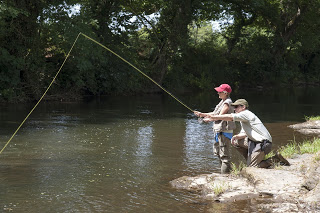Life as a Fly Fishing Guide
Let’s say you love fly fishing. You have been at it for a long time and gotten quite good. Your experience can be measured in decades. You catch a lot of fish. Big fish, and you have the pictures to prove it. You learned to tie your own flies. They were sloppy at first, but after years of repetition, they are now comparable to the flies you can buy in your local fly shop. You have taken first-time fly fishers out, taught them how to cast and put them on fish. Your mind begins to wander in ever-widening circles. You are thinking to yourself, “how could I do this every day?” For many, the answer is to become a guide.
Guiding can be a fun and rewarding career, but it can also be a lot of work. It’s not just the fishing either. The real work is off the water and off the clock. There are lunches to be packed, flies to be tied, rods to be untangled and prepared for the next trip. An eight-hour day can easily turn into ten. One of the hardest parts for new guides to grasp is that it’s not fishing. You are not there to fish; you are there to take care of your clients. You are the official un-tangler, knot tier, fly selector, and caddy. If you don’t tie your own flies and you plan to guide, you will quickly learn to tie. When you are going through two dozen flies a week, that gets expensive to replace at the local fly shop.
I can’t make this any clearer, you are not there to fish. As a confession, I have broken this rule twice. Both times when invited by clients. I admit I was unable to pull it off successfully. I found myself not really fishing because I was so busy watching my clients, or I was concentrating so hard on my own fishing that I practically forgot that I had clients. It didn’t work effectively either way.
One thing that I
would recommend to anyone that is considering guiding is to attend a reputable
guide school. They may be a little pricey for some, but the knowledge you gain
will justify the price.
I attended the
Sweetwater Travel Co. Fly Fishing Guide School in March of 2016. The week-long
program was held at the Bighorn Angler Lodge in Ft. Smith, Montana. The
classroom was the famed Big Horn River.
Most of our days
we were on the water learning to row a drift boat and taking turns working as
the guide. There were three students and an instructor in the boat and being
inexperienced boat rowers, it got a little hectic at times.
We each got a day
working out of a jet boat. This is something I was confident in. I had been
driving motorboats since before I was old enough to have a driver’s license. It
was also a lot of fun to slide the boat around river bends like you were
driving a dirt track stock car.
We also had plenty
of classroom instruction. We spent a half day at the vise tying various standard
patterns. Some of these were patterns I had never tied before but were similar
enough to other flies I had tied, so there was a comfort factor involved.
We also were
certified in CPR and first aid, a requirement for guiding in many
states. Our course was taught by a Livingston firefighter/EMT. He was a
boisterous, bundle of energy with a great sense of humor who made an
uncomfortable subject enjoyable.
We spent ample
time on knot tying and were even given an assignment to be completed before the
end of the course. This consisted of tying a makeshift leader using a variety
of knots and was checked by the instructors, much like a teacher passing out
grades.
On one of our final days were taught casting instruction. Our instructor was Brant Oswald, a guide on the spring creeks near Yellowstone National Park. Brant has over 30 years’ experience as a guide and casting instructor. He also served as an advisor on A River Runs Through It, and to watch him lay out perfect cast time and again can be quite intimidating when you know he is getting ready to watch you cast.
Guiding does have its advantages. You are working outdoors in beautiful scenery; you will become a better angler yourself by noticing mistakes that other anglers make, and you get to make your own schedule. Just keep in mind, you should not guide just because you like to fish.




Comments
Post a Comment